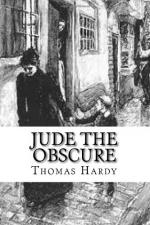|
This section contains 6,621 words (approx. 23 pages at 300 words per page) |

|
SOURCE: "Jude the Obscure: Reading and the Spirt of the Law", in ELH, Vol. 50, No. 3, 1983, pp. 607-623.
In the following essay, Saldívar probes the nature of meaning and referentiality in relation to Hardy's novel, contending that "the narrative of Jude the Obscure, while telling the story of Jude's and Sue's unhappy marriages, also dispels the illusion of a readable truth."
The letter killeth, but the spirit giveth life.
—II Corinthians
Concern for the nature and response of an author's audience is, in some respects, one of the original tasks of literary criticism. Over the past decade, however, attempts to incorporate rhetorical, linguistic, and cognitive theories into literary criticism have led to the development of a hefty bibliography on the nature of the reader's role in the communication network of author, text, and reader. These reader-oriented studies stress, from their various perspectives, that the reader, as much as...
|
This section contains 6,621 words (approx. 23 pages at 300 words per page) |

|


